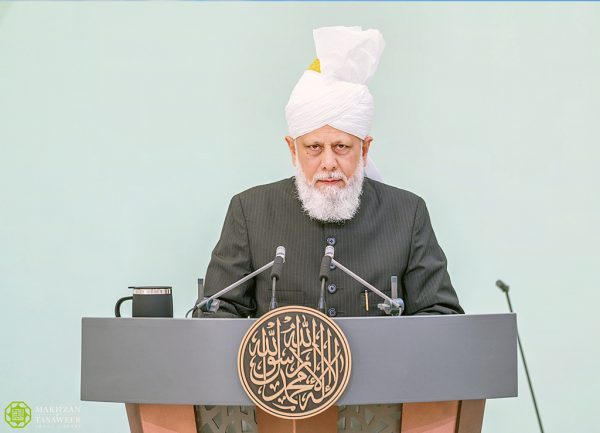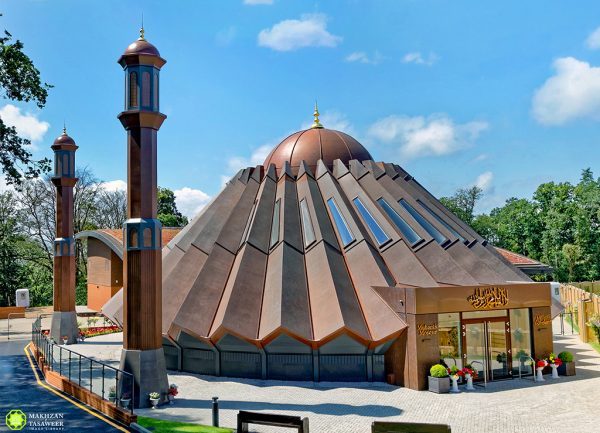After reciting Tashahhud, Ta‘awwuz and Surah al-Fatihah, His Holiness, Hazrat Mirza Masroor Ahmad (aba) said that he would continue narrating incidents from the Battle of Uhud.

False News of the Holy Prophet (sa) Being Martyred in Battle
His Holiness (aba) said that the disbelievers had spread the false news that the Holy Prophet (sa) had been martyred. There are various narrations regarding who the initial spreader of this rumour was. Hazrat Thabit (ra) said to the Ansar that even if it were true that the Holy Prophet (sa) had been martyred, God is still Alive and they should fight for his sake. Hence, this small group of Muslims waged an attack against a group of disbelievers which included Khalid bin Walid. Khalid’s army responded with such force that the group of Muslims was martyred.
His Holiness (aba) quoted Hazrat Mirza Bashir Ahmad (ra) who writes:
‘At the time, the Muslims were divided into three groups. One group was of those who had fled from the field of battle upon hearing news that the Holy Prophet (sa) had been martyred, but this group was the smallest of all, and included Hazrat Uthman bin Affan (ra) as well. However, as mentioned in the Holy Qur’an, taking into consideration the special circumstances of that time, and the heartfelt faith and sincerity of these people, Allah the Exalted forgave them.
From among these people, some had even reached Madinah, and in this manner, news of the so-called martyrdom of the Holy Prophet (sa) and defeat of the Muslim army managed to reach Madinah as well. A state of lamentation broke out in Madinah, and the Muslim men and women, both young and old, all came out of the city in a state of immense dismay, and set out towards Uhud. Some made haste to the field of battle and plunged into the enemy ranks in the name of Allah. The second group consisted of such people who had not fled, but upon hearing news of the martyrdom of the Holy Prophet (sa), had either lost determination or felt that now it was useless to fight. Hence, they had moved to one side of the battlefield, and sat down with their heads hanging low. The third group was of those who continued to fight on without fail. Among them, some consisted of those people who were gathered around the Holy Prophet (sa) and were exhibiting unprecedented feats of valour, and most of them were fighting in the field of battle scattered apart from one another. As these people, and those from the second group continued to discover that the Holy Prophet (sa) was alive, these people would continue to fight and close in around the Holy Prophet (sa) in the likeness of those possessed by madness.
The state of war at the time was such that the army of the Quraish would push forward from all four fronts in the likeness of ferocious ocean waves. A rain of arrows and stones was falling upon them in the battlefield from all directions. Upon witnessing this state of danger, these devotees surrounded the perimeter of the Holy Prophet (sa) and shielded his blessed body with their own. However, despite this, whenever the force of the attack would surge forward, this handful of men would be jostled here and there, and in this state, at times, the Holy Prophet (sa) would almost be left standing alone. Upon one such instance, a stone thrown by Utbah bin Abi Waqqas, the idolatrous brother of Sa‘d bin Abi Waqqas (ra), struck the blessed countenance of the Holy Prophet (sa), which broke his tooth and also wounded his lip. Shortly after, another stone thrown by Abdullah bin Shahab wounded the forehead of the Holy Prophet (sa). Then, a third stone thrown by Ibni Qum’ah struck the blessed cheek by which two rings on the ‘Mighfar’ (or helmet) of the Holy Prophet (sa) pierced into his cheek. Sa‘d bin Abi Waqqas (ra) was so enraged at this action of his brother Utbah, that he would say he never felt so eager to kill an enemy, as he was to kill Utbah on the day of Uhud.’
(The Life and Character of the Seal of Prophets (sa), Vol. 2, pp. 335-337)
The Companions Fend off Attacks Against the Holy Prophet (sa)
His Holiness (aba) said that Hazrat Abu Ubaidah (ra) was the first among the companions to catch a glimpse of the Holy Prophet (sa) after this rumour had started spreading. He saw the eyes of the Holy Prophet (sa) sparkling from beneath his armour. Hazrat Abu Ubaidah (ra) started to call out to the others to let them know, however, the Holy Prophet (sa) indicated towards him to remain quiet. However, the news still started spreading, and as the Muslims heard, they began rushing towards the Holy Prophet (sa) to see for themselves. Surrounded by his companions, the Holy Prophet (sa) moved to a mountain pass in Uhud. As they were moving, the companions valiantly fended off any and all attacks.
His Holiness (aba) said that a chieftain of Makkah named Ubayy bin Khalaf also launched an attack on the Holy Prophet (sa). He was among the prisoners from the Battle of Badr who had offered a ransom for their release. During the Battle of Uhud, the Holy Prophet (sa) had cautioned his companions that he felt Ubayy bin Khalaf would attack him from behind during the course of the battle. As Ubayy was approaching, the companions informed the Holy Prophet (sa) and asked if they should stop him, however, the Holy Prophet (sa) instructed them to let him approach. As he approached, the Holy Prophet (sa) took a spear from one of his companions and launched it at Ubayy bin Khalaf which wounded him. Ubayy bin Kahalf eventually died as he was returning to Makkah after the battle.
His Holiness (aba) quoted Hazrat Mirza Bashir Ahmad (ra) who writes:
‘After the Quraish had fallen back to some extent and the Muslims who were present in the battlefield caught sight of the Holy Prophet (sa), they gathered around him. With this party of companions, the Holy Prophet (sa) slowly began to climb to the mountain top and reached a secure mountain pass. On the way, Ubayy bin Khalaf, a chief of Makkah, caught sight of the Holy Prophet (sa). Blinded by his enmity and malice, he ran towards the Holy Prophet (sa), calling out the words, “If Muhammad [sa] escapes alive, then I am finished.” The companions attempted to restrain him, but the Holy Prophet (sa) said, “Leave him and let him come to me.” When he reached in close range of the Holy Prophet (sa) in order to attack him, the Holy Prophet (sa) took a lance and administered a single strike, by which he took a spin and fell to the ground. Then he stood up and ran back yelling and screaming, and although the wound was not too severe, he was laid to rest before reaching Makkah.’
(The Life and Character of the Seal of Prophets (sa), Vol. 2, pp. 340)
His Holiness (aba) further quoted Hazrat Mirza Bashir Ahmad (ra) who writes:
‘When the Holy Prophet (sa) had arrived at the mountain pass, a contingent of the Quraish headed by Khalid bin Walid attempted to ascend the mountain and wage an attack, but on the command of the Holy Prophet (sa), Hazrat Umar (ra) fought them along with a few Muhajirin and drove them off.’
(The Life and Character of the Seal of Prophets (sa), Vol. 2, pp. 340)
Wounds Sustained by the Holy Prophet (sa)
His Holiness (aba) said that the Holy Prophet (sa) was wearing two layers of armour, and then due to the injuries he had sustained, he was experiencing some weakness, and thus it was difficult for him to climb onto the mountain. Seeing this, Hazrat Talhah bin Ubaidillah (ra) helped the Holy Prophet (sa) climb up.
His Holiness (aba) said that in the course of the battle, the Holy Prophet (sa) lost a tooth and the rings of his helmet had lodged themselves into his face. Hazrat Abu Ubaidah (ra) was going to pull the rings out, but he didn’t wish to do so with his hands. Thus he used his teeth to pull the first ring out, and as he did, one of his front teeth broke. Then he did the same for the second ring, and as a result, a second one of his front teeth broke. It is recorded that of those companions who had lost their teeth, Hazrat Abu Ubaidah (ra) was the most handsome.
His Holiness (aba) said he would continue narrating these incidents in the future.

Appeal for Prayers for Palestinians And Muslim Nations
His Holiness (aba) again urged prayers for Palestine. His Holiness (aba) said that the state of Muslim nations is such that instead of uniting to help the people of Palestine, they have started fighting among themselves. It has been reported that a conflict has started between Pakistan and Iran and both have dropped bombs on each other. This is the dangerous situation that is playing out. His Holiness (aba) prayed that may Allah grant Muslim nations and leaders wisdom and understanding. May Allah grant them the ability to understand their purpose and may they become a united people.
Funeral Prayers
His Holiness (aba) said that he would offer the funeral prayers in absentia of the following:
Syed Malud Ahmad
Syed Malud Ahmad son of Syed Daud Muzaffar Shah. He was the grandson of the Second Caliph, Hazrat Mirza Bashiruddin Mahmud Ahmad and Hazrat Umme Tahir. He was His Holiness’ (aba) cousin, and the older brother of His Holiness’ (aba) respected wife. His Nikah was announced by the Third Caliph (rh). His Holiness (aba) read out the sermon delivered by the Third Caliph (rh) on that occasion, in which he emphasised the importance of ‘saying the right word’ in martial matters. He was regular in offering prayers and was also regular in offering tahajjud (pre-dawn voluntary prayers). He was regular in offering alms and financial contributions and also encouraged his children to do the same. He would maintain relationships with everyone and never held any malice in his heart. Even if someone had wronged him, he would always treat them with the highest standard of morals. His Holiness (aba) attested to the fact that he certainly possessed all of these virtuous qualities. Once when he was young, he accompanied the Second Caliph (ra) to one of his farms. Mangoes were also grown there, and there was a crate of mangoes there that belonged to the workers who took care of the fields. As a young boy, Syed Malud picked up one of the mangoes, however the Second Caliph (ra) advised him to return it as it did not belong to him. In this way, even from a young age, the Second Caliph (ra) taught him a very valuable lesson. His Holiness (aba) prayed that may Allah grant him forgiveness and mercy, protect his wife and children, and enable them to carry on the legacy of his virtues.
Akmid Ag Muhammad
Akmid Ag Muhammad from Dori, Burkina Faso. He is survived by two wives, ten sons and five daughters. He passed away resulting from a severe heart attack. He accepted Ahmadiyyat in 1999. He was very active in propagating the message of Islam Ahmadiyya and as a result of his efforts various chapters were established. He served as the local president in Mahdi Abad for five years. He was instrumental in helping the families of the martyrs of Mahdi Abad in resettling and serving them in any way they needed. He was regular in offering prayers and he was extremely obedient to the system of the Community. His Holiness (aba) prayed that may Allah grant him forgiveness and mercy, grant patience to his family and enable them to carry on the legacy of his virtues.
Summary prepared by The Review of Religions



Add Comment